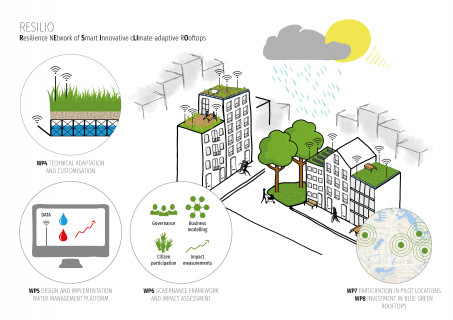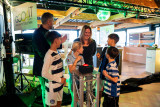The EU-UIA funded the programme RESILIO, a project that aims to realize 10.000 square meters of blue-green roofs in four city districts in Amsterdam. The consortium of both public and private partners aims to build an interconnected network of smart roofs, in which sensors and state-of-the-art equipment enable micro-water management on rooftops. This contributes to urban climate adaption and resilience, and can potentially evolve into a scalable solution for water management on rooftops.
This project is co-financed by the European Regional Development Fund through the Urban Innovative Actions Initiative.
<https://www.uia-initiative.eu/en/uia-cities/amsterdam>
What is the goal of the project?
Amsterdam is experiencing the effects of climate change: flash floods due to heavy rainfall, higher temperatures and increased droughts. The RESILIO project aims to address critical urban climate challenges related to flooding, heat, water supply, energy consumption and urban livability by repurposing the rooftops of climate-vulnerable neighbourhoods of Amsterdam. The 10,000m2 area of smart blue green roofs is expected to help the city adapt to climate change by reducing impacts of heavy rain, urban heat island effect and drought while improving building insulation, biodiversity and quality of life.
What is the result of the project?
Amsterdam’s rainwater resilience, by adding 5600m3 of water managed over a year without any damage. Regular roofs turned into blue green roofs should reduce urban heat effect, energy consumption at building level, sewer overflows, urban flooding. They will provide more urban green spaces thereby increasing biodiversity and citizen wellbeing. To verify the impacts of the project, there will be an established monitoring plan, with studies in the realms of social, fiscal, hydrological, climate adaptive and energy saving aspects. Empowering 1500 residents of all socioeconomic levels to engage through bottom-up and co-creation approach will advance resilient climate strategies and governance.
Who initiated the project and which organizations are involved?
The City of Amsterdam initiated the project. The following organizations are involved:
Hogeschool van Amsterdam - higher education and research institute
Vrije Universiteit - higher education and research institute
Waternet - public water management company
MetroPolder Company - SME
Consolidated - SME
Stadgenoot - social housing company
De Key - social housing company
De Alliantie - social housing company
Rooftop Revolution - foundation
What can other cities learn from your project?
Key succes factors will be shared in later stages of the project.





